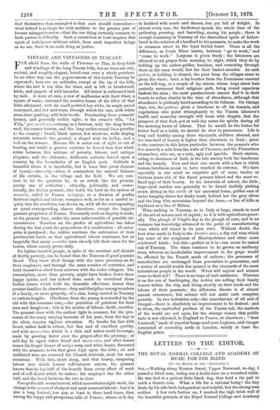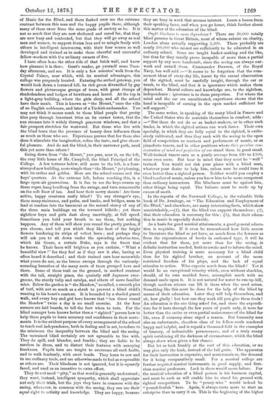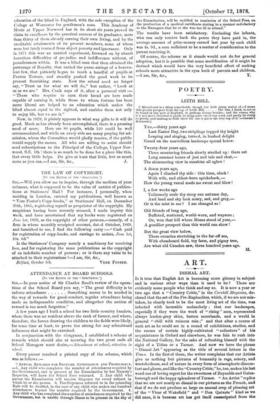LETTERS TO THE EDITOR.
THE ROYAL NORMAL COLLEGE AND ACADEMY OF MUSIC FOR THE BLIND.
[TO THE EDITOR OF THE SPECTATOR.']
Sin,—Walking along Weston Street, Upper Norwood, to-day, I passed a blind man, doling out a feeble tune on a wretched violin. He was tied to a patient little black dog, that held a tin pail to catch a chance coin. What a life for a rational being ! the tiny brute by his side both independent and helpful, but the strong man neither. A few rods further on, I reached the high brick wall of the beautiful grounds of the Royal Normal College and Academy of Music for the Blind, and there flashed over me the extreme contrast between this man and the happy pupils there, although many of them came from the same grade of society as he. It is not so much that they are now sheltered and cared for, that they are now busy and contented, but that they will go away as real men and women, to support theme lves and to mingle freely with others in intelligent intercourse, with their four senses so well developed and trained as to make them cheerful and successful fellow-workers with the ordinary owners of five.
I have often bLea the other side of that brick wall, and know how pleasant it is there. Gentle reader, go yourself some Tues- day afternoon, and see. It is only a few minutes' walk from the Crystal Palace, near which, with its musical advantages, this college was purposely located. Entering the arched gateway, you would look down a terraced hill, its rich green diversified by gay flowers and picturesque groups of trees, with great clumps of rhododendron and hedges of hawthorn and laurel. At the top is a light-gray building, where the girls sleep, and all the school have their meals. This is known as "the Mount," once the villa of an English nobleman, and later of a Turkish ambassador. You may not think it means much to these blind people that pretty tiles peep through luxuriant ivies on its corner tower, that the sun streams into it widely through generous windows, and that a fair prospect stretches far westward. But those who live with the blind learn that the presence of beauty does influence them as much as those who see. Experience proves that for them also does it stimulate the imagination, refine the taste, and give cheer- f al pleasure. And do not the blind, in their narrower path, need this yet more than others ?
Going down from "the Mount," you pass, near it, on the left, the cosy little home of Mr. Campbell, the blind Principal of the College. A few terraces below, still more to the left, is a four- storeyed new building, more simple than "the Mount," yet pleasing, with its arches and gables. Here are the school-rooms and the boys' quarters. At the extreme left, before reaching this, is a large open-air gymnasium. It is fun to see the boys swarm up those ropes, hang headlong from the swings, and turn somersaults on the soft floor of tan. And hear their merry shouts ! Are those active, happy creatures really blind ? To any stranger's eye, these many staircases, and paths, and banks, and bridges, seem to lead at random into the basement or the second storey of any of the three main buildings on the terraced hillside ; yet these sightless boys and girls dash along unerringly, at full speed. Sometimes you hold your breath to see them, but nothing happens. Any of them will show you round the pretty garden, if you choose, and tell you which they like best of the bright flowers bordering its strips of velvet lawn ; and perhaps they will ask you to sit down under the spreading arbutus-tree, which his Grace, a certain Duke, says is the finest that he knows. Their faces will brighten as you exclaim, "What a beautiful view !" for they feel as if they saw it also, having so often heard it described ; and their trained ears hear meanwhile what yours do not, as the breeze sweeps through the variously- sounding branches of the many sorts of trees grouped here and there. Some of these trail on the ground, in marked contrast with the tall, straight pines, the quaintly stiff Japanese ever- greens, the sturdy tulip and catalpa, and others of more familiar mien. Below the garden is "the Meadow," so called, a smooth plot of turf, with not so much as a shrub to prevent a blind child's running to his heart's content. It is bounded by a shaded gravel walk, and every boy and girl here knows that "ten times round the Meadow" twice a day is no small exercise. At the four corners are laid boards, to tell the foot when to turn. For the blind manager here knows better than a "sighted" person how to help these pupils to learn accuracy and confidence in their move- ments. It is the evident purpose of every arrangement of the school to teach real independence, both in feeling and in act, to reduce to the minimum the inequality between the blind and the seeing. The untrained blind certainly are not agreeable to live with. They do spill, and blunder, and fumble ; they are liable to be careless in dress, and to distort their features with annoying frankness. Pupils here are taught to overcome all such faults, and to walk fearlessly, with erect heads. They learn to sew and to use ordinary tools, and are otherwise made to feel as responsible as others are. Their blindness is not ignored, but it is squarely faced, and used as an incentive to extra effort.
They do not need "pity," as that word is generally understood ; they want, instead, intelligent sympathy, which shall appreciate not only their trials, but the joys they have in common with the seeing, whenever, in common with the seeing they can use their equal right to activity and knowledge. They are happy, because they are busy in work that arouses interest. Learn a lesson from their speaking faces, and when you go home, think further about this matter of the education of the blind.
Ought blindness to mean dependence ? There are 30,000 totally blind persons in Great Britain, most of whom subsist on charity,
London alone actually supporting 2,200. There probably are nearly 100,000 who cannot see sufficiently to be educated in an ordinary school. Some are taught basket-making and the like, but thus far they usually prove incapable of more than a partial support by any mere handicraft, since the seeing can always out- work and outsell them. Commander Dawson, of the Royal Navy, has well said :—" It seems to be forgotten that the com- monest ideas of every-day life, learnt by the casual observation of the sighted, must be carefully taught, through the ear or touch, to the blind, and that it is ignorance which makes them dependent. Mental culture and knowledge are, to the sightless, independence ; ignorance is to them pauperism. For where the mind and the ear are uncultivated, experience shows that the band is incapable of earning in the open market sufficient for self-support."
The same writer, in speaking of the many blind in France and the United States who do maintain themselves in comfort, adds : —" But these do not do so as basket-makers, or in other such trades, in which the sighted artisan can work faster. Their own specialty, in which they are fully equal to the sighted, is exclu- sively cultivated, and thus they rank with the seeing in the open
field of competition as teachers and performers of music, or as pianoforte tuners, and in other positions where their peculiar con- centration of mind and perfection of ear stand them in good stead.
Well-trained tuners earn as a yearly average from £80 to £100, some even more. But bear in mind that they must be " well "
trained. You would not risk your piano with a blind man, whatever your desire to help him, unless sure he could tune it even better than a sighted person. Neither would you employ a blind teacher of music, unless you knew him to be more competent than ordinary instructors. His blindness must be against him, other things being equal. The balance must be made up by excess of merit.
In the reports of the Norwood College, in the valuable little book of Dr. Armitage, on "The Education and Employment of the Blind," and elsewhere, are many interesting facts, which show unmistakably,—(1), that the blind can support themselves ; (2), that their education is necessary for this ; (3), that their educa- tion in music is especially desirable.
As a basis for good musical attainments, a good general educa- tion is requisite. If it even be remembered how little access to literature the blind as yet have, as much from the fewness as from the expensiveness of books in embossed type, it will be evident that for them, yet more than for the seeing, is definite instruction needed, both to awake and to inform the mind.
Even physical training is more necessary for a blind child than for his sighted brother, on account of the more restricted freedom of his plays, and the lack of equal stimulus to action. Who expects much from the blind ? Yet it would be an exceptional vivacity which, even without shackles, should, of its own unaided force, accomplish much with no demand made upon it. It is not natural for water to run up-hill, though modern science can lift it there when the need arises.
Something like this must be done for the help of the blind by means of their education. Later they will help themselves, and oh, how gladly ! but how can they work till you give them tools?
An education is the one thing asked for, and since the expendi- ture for it lasts through the few years of youth only, it were far better than the entire or even partial maintenance of the blind for life, even if economy alone urged a reason. But humanity sees also an unfortunate, cheerless class of its fellow-souls rendered happy and helpful, and is repaid a thousand-fold in the examples of bravery, of indomitable perseverance, and of a truly sunny spirit outshining all the darkness of circumstance, which the blind always show when given a fair chance.
But let us look frankly at the cost of this education, or we may give only the busk, instead of the full grain. The apparatus for their instruction is expensive, and must remain so, the demand for it being comparatively small. For a musical college are further required musical instruments in good supply, and first- class musical professors. Lack in these would mean failure. For the musical education of a blind person is his business capital, and must be such as will enable him to stand his ground with sighted competitors. To be " penny-wise " would indeed be " pound-foolish " here. Again, it always costs more to start an enterprise than to carry it on. This is the beginning of the higher education of the blind in England, with the sole exception of the College at Worcester for gentlemen's sons. This Academy of Music at Upper Norwood has in its short six years proved its claim to excellence by the practical success of its graduates, more than thirty of them already earning their own living, and by the creditable attainments of its present members, some of whom were but lately rescued from abject poverty and ignorance. Only in 1871 this was an untried experiment, frowned on by almost herculean difficulties of prejudice and indifference without, of pennilessness within. It was a blind man that then obtained the patronage of Royalty, that untied the purse-strings of a benevo- lent few, that patiently began to teach a handful of pupils at Paxton Terrace, and steadily pushed the good work to its present flourishing state. Now the school need no longer say, "Trust us for what we will do," but rather, "Look at US as we are." Mrs. Craik says of it, after a personal visit :— " Those who require to earn their bread are here made capable of earning it, while those to whom fortune has been more liberal are helped to an education which makes the blind almost equal to the sighted, and enables them not only to enjoy life, but to use it."
Now, in 1878, it plainly appears in what way gifts to it will do good. Much as has already been accomplished, there is a pressing need of more. Here are 80 pupils, while 120 could be well accommodated, and while on every side are many praying for ad- mission, whom the Committee would gladly receive, if the public would supply the means. All who are willing to assist should send subscriptions to the Principal of the College, Upper Nor- wood, S.E. Oh ! there is so much to be done for a place like this, that every little helps. Do give at least that little, but as much more as you can.—I am, Sir, &c., J.




































 Previous page
Previous page